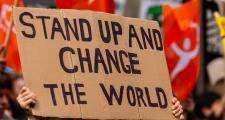We are activists – be proud of it

Social workers must “be the educator” within communities, empowering them to fight for what they need to thrive.
That was the message from Chicago-based community activist Ronnie Harris speaking at a webinar hosted by the Scottish Association of Social Work (SASW) entitled ‘Still We Rise’ last month.
The session asked how social workers can be activists for societal change in the face of systems and barriers that often prevent them from doing so.
Harris emphasised the profession’s role in reversing “the notion of individualism” that thwarts communities from acting collectively against problems such as “unjust levels of poverty, pain and trauma”.
He said: “I've always said if you want to know how one little boy could pick up a gun and shoot another, it is because he has no sense of connectedness to that other boy.
“I remember growing up we had fights and disagreements, but it would only go so far because there was this sense of connectedness between me, that other boy, my family, that other boy’s family, our church or our institutions.”
Individualism has created “a community of individuals that have no sense of the collective”, he said, something that social work had a role to play in addressing.
“I think is has been the work of the social work throughout history to really have this sense of responsibility to be the educator in the room, the community-based educator in the room.”
One of the key barriers to empowering communities in recent times has been a reduction in community resources, said Jill Keegan, partnership manager for the Scottish Community Alliance.
“We've been increasingly de-resourced in so many different ways. So the money available to provide community development and community workers who could work alongside social workers has been hugely decreased which has had a huge impact on our ability to connect.”
Keegan said communities needed more control over local budgets and called for a greater focus on community-based work within social work.
Keegan, whose husband is a social worker, added: “I can see the pain that he goes through – he works in a in a position where he would love to have more time to work around empowerment and making links with local community and working in partnership, but he just doesn't have the time.
“Change isn’t going to happen if decision-making remains completely central in Scotland. It has to be brought closer to communities.”
She called for the community sector and social workers to work more collaboratively to make it harder for government to ignore when they lobby for change.
Caroline McDonald, deputy chair of SASW, agreed, adding: “I was talking to a social worker recently who said it feels so deflating – you are coming in every day working incredibly hard, really long hours trying to make a difference but we’re seeing the impact of austerity.
“Social workers want to be active, but I think figuring out how to do that is difficult.”
She stressed being a member of SASW has helped her speak out through a “collective strength in numbers” and make a difference at governmental level.
“I've been able to influence policy and legislation that impacts on social workers but also the wider society.
“I feel really strongly that social workers should have a platform to amplify your voices in what we need for social workers but also the people that we work with.”
McDonald urged social workers to “be proud and be brave” as activists.
John McGowan, general secretary of the Social Workers Union, said activism has been “part of my DNA”.
But he expressed concern that it was being side-lined within social work education, both by educators and learners.
“There are a lot of career-minded applicants in social work now, and perhaps they need to reflect more on that activist side,” he said.
“Unfortunately, activism has dropped off the teaching, it is more focused on the standards and meeting the criteria rather than achieving change.”
McGowan said it has become harder for social workers to engage in activism compared to when he started out in social work.
He urged more social workers to join the British Association of Social Workers and the Social Workers Union to ensure the profession’s voice is heard.
“There are about 109,000 social workers in the United Kingdom. Just 22,000 of them have joined the professional association. So there's something wrong there – there’s still a lot of work to be done with social workers.
“They should be having that sense identity to say, ‘I want to join the professional association, I want join the only specialist union for social workers’.”
